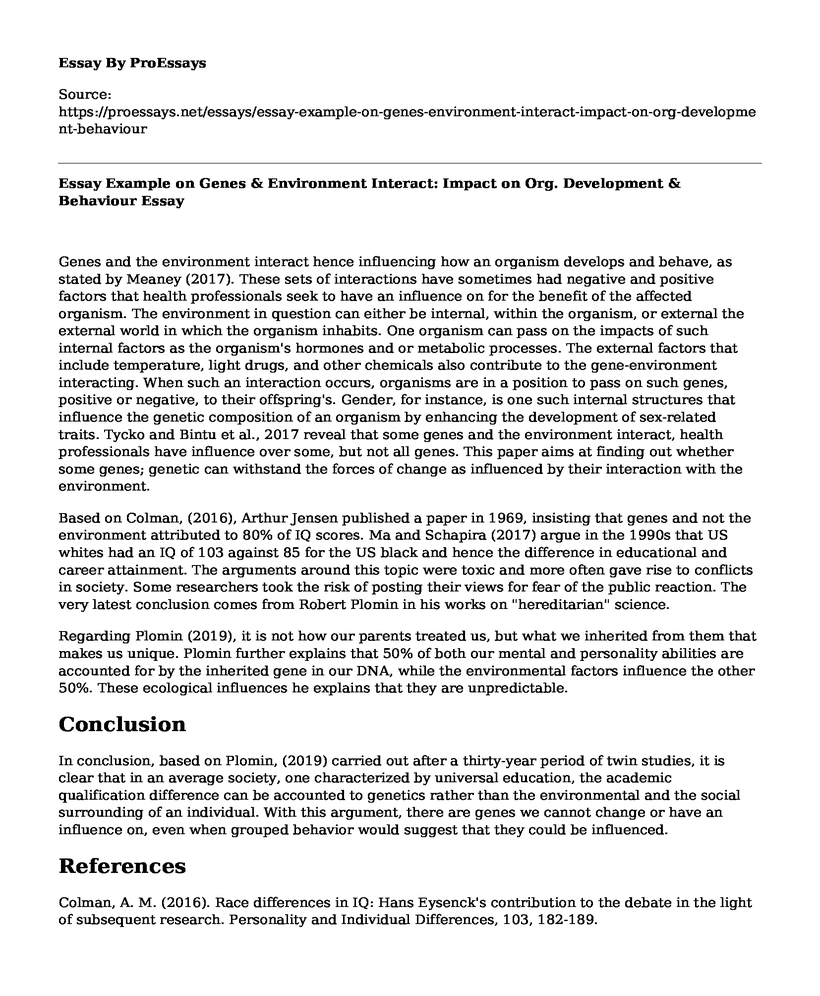Genes and the environment interact hence influencing how an organism develops and behave, as stated by Meaney (2017). These sets of interactions have sometimes had negative and positive factors that health professionals seek to have an influence on for the benefit of the affected organism. The environment in question can either be internal, within the organism, or external the external world in which the organism inhabits. One organism can pass on the impacts of such internal factors as the organism's hormones and or metabolic processes. The external factors that include temperature, light drugs, and other chemicals also contribute to the gene-environment interacting. When such an interaction occurs, organisms are in a position to pass on such genes, positive or negative, to their offspring's. Gender, for instance, is one such internal structures that influence the genetic composition of an organism by enhancing the development of sex-related traits. Tycko and Bintu et al., 2017 reveal that some genes and the environment interact, health professionals have influence over some, but not all genes. This paper aims at finding out whether some genes; genetic can withstand the forces of change as influenced by their interaction with the environment.
Based on Colman, (2016), Arthur Jensen published a paper in 1969, insisting that genes and not the environment attributed to 80% of IQ scores. Ma and Schapira (2017) argue in the 1990s that US whites had an IQ of 103 against 85 for the US black and hence the difference in educational and career attainment. The arguments around this topic were toxic and more often gave rise to conflicts in society. Some researchers took the risk of posting their views for fear of the public reaction. The very latest conclusion comes from Robert Plomin in his works on "hereditarian" science.
Regarding Plomin (2019), it is not how our parents treated us, but what we inherited from them that makes us unique. Plomin further explains that 50% of both our mental and personality abilities are accounted for by the inherited gene in our DNA, while the environmental factors influence the other 50%. These ecological influences he explains that they are unpredictable.
Conclusion
In conclusion, based on Plomin, (2019) carried out after a thirty-year period of twin studies, it is clear that in an average society, one characterized by universal education, the academic qualification difference can be accounted to genetics rather than the environmental and the social surrounding of an individual. With this argument, there are genes we cannot change or have an influence on, even when grouped behavior would suggest that they could be influenced.
References
Colman, A. M. (2016). Race differences in IQ: Hans Eysenck's contribution to the debate in the light of subsequent research. Personality and Individual Differences, 103, 182-189.
Ma, C., & Schapira, M. (2017). The bell curve: Intelligence and class structure in American life. CRC Press.
Meaney, M. J. (2017). Epigenetics and the biology of gene environment interactions. In Gene-Environment Transactions in Developmental Psychopathology (pp. 59-94). Springer, Cham.
Plomin, R. (2019). Blueprint: How DNA makes us who we are. Mit Press.
Tycko, J., Van, M. V., Elowitz, M. B., & Bintu, L. (2017). Advancing towards a global mammalian gene regulation model through single-cell analysis and synthetic biology. Current Opinion in Biomedical Engineering, 4, 174-193.
Cite this page
Essay Example on Genes & Environment Interact: Impact on Org. Development & Behaviour. (2023, Apr 23). Retrieved from https://proessays.net/essays/essay-example-on-genes-environment-interact-impact-on-org-development-behaviour
If you are the original author of this essay and no longer wish to have it published on the ProEssays website, please click below to request its removal:
- Emergency Management COOP Analysis
- Christian View on Abortion - Essay Sample
- DateCritical Reflection of the Illocutionary Acts in Scene 16 of Dead Poets Society
- Essay Example on Marijuana, Hemp, Cannabis: What's the Difference?
- Essay Example on MSF: Providing Medical Care to Distressed Populations
- Paper Sample on Schizophrenia: Illusions & Misconceptions of Reality
- Essay Sample on Ultrasound: A Nurse's Tool to Identify Pressure Injuries







